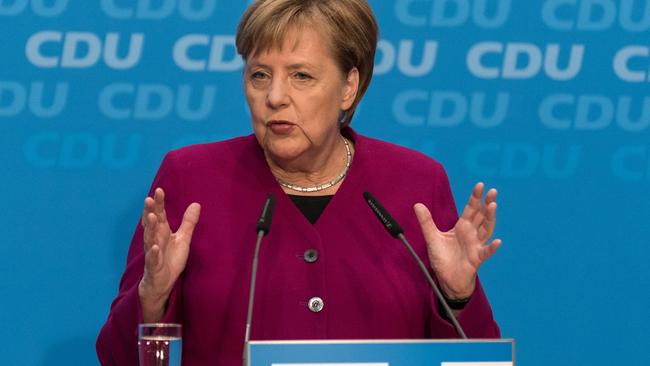What Angela Merkel’s resignation as party leader means
Angela Merkel’s decision to quit as party leader makes her immediate future as Germany’s leader much more precarious.

Germany’s Chancellor Angela Merkel announced the beginning of the end of her time as the country’s leader on Monday, saying she won’t seek re-election as head of the conservative Christian Democratic Union when the party meets in December. She also said she would stand down as chancellor once the current legislative term ends in 2021. Here’s a look at the potential consequences of the announcement:
What does Angela Merkel’s decision to give up the party leadership mean?
Ms Merkel’s decision ends her 18-year leadership at the Christian Democratic Union party. She wants to stay on as Chancellor, with the current coalition government continuing until the legislative term ends in 2021.
She could also resign prematurely. The lower house of parliament could then vote on her successor without Germany’s president having to call for snap elections.
Giving up the influential party post as chairwoman could make Ms Merkel politically vulnerable.
She said Monday that she no longer believed that leadership of the party and the chancellorship should be held by one person. This is a switch in position for Ms Merkel, who previously has said her predecessor Gerhard Schröder made a mistake in 2004 when he resigned as party chairman of the Social Democrats but stayed on as chancellor. He sought snap elections one year later and was ousted by Ms Merkel.
How will the CDU choose a new party leader and why does it matter?
The CDU holds its convention from December 7 in Hamburg, where delegates will vote for a new party leader. But the outcome will be crucial for Ms Merkel’s future as chancellor.
An ally could help smooth her continuation as chancellor but the election of a rival could make Ms Merkel’s life, and that of the ruling coalition government, difficult. Two senior party leaders have put their names forward: Annegret Kramp-Karrenbauer — a Merkel ally, former prime minister of the state of Saarland and CDU general secretary since February and Jens Spahn — a conservative rival of Ms Merkel and current health minister who in the past sharply criticised the chancellor’s migration policies.
What if a rival from within her party becomes a leader?
Ms Merkel could decide to stay in power as chancellor or seek a vote of confidence in the lower house of parliament to bolster her position. If she doesn’t win a majority, German President Frank-Walter Steinmeier would then be able to dissolve the Bundestag within 21 days and call for new elections. He would lose the right to dissolve parliament if the lower house calls for a new chancellor vote and holds the vote successfully within 48 hours.
What if Ms Merkel steps down as chancellor at a later stage?
Any German citizen older than 18 can become chancellor. The candidate doesn’t need to be a member of parliament, making Ms Kramp-Karrenbauer and Friedrich Merz — the darling of the conservatives’ business-wing and another possible candidate for party leadership — eligible. Germany’s President Steinmeier would propose a candidate to be voted on by the 709-seat lower house. To win, the candidate needs an absolute majority — half of politicians present plus one — otherwise the lower house has 14 days to vote for a second candidate. If no candidate gets an absolute majority during this period, MPs then vote again and the winner needs only a simple majority. Germany’s president can then appoint the successful candidate as chancellor within seven days or dissolve parliament and call for elections.
When would the next general elections be held in that case?
If President Steinmeier dissolves parliament, Germany would need to hold national elections within 60 days. This happened last in 2005 when Ms Merkel’s predecessor Mr Schröder sought a vote of confidence in the lower house, which he intended to lose to pave the way for snap elections.
The Wall St Journal



